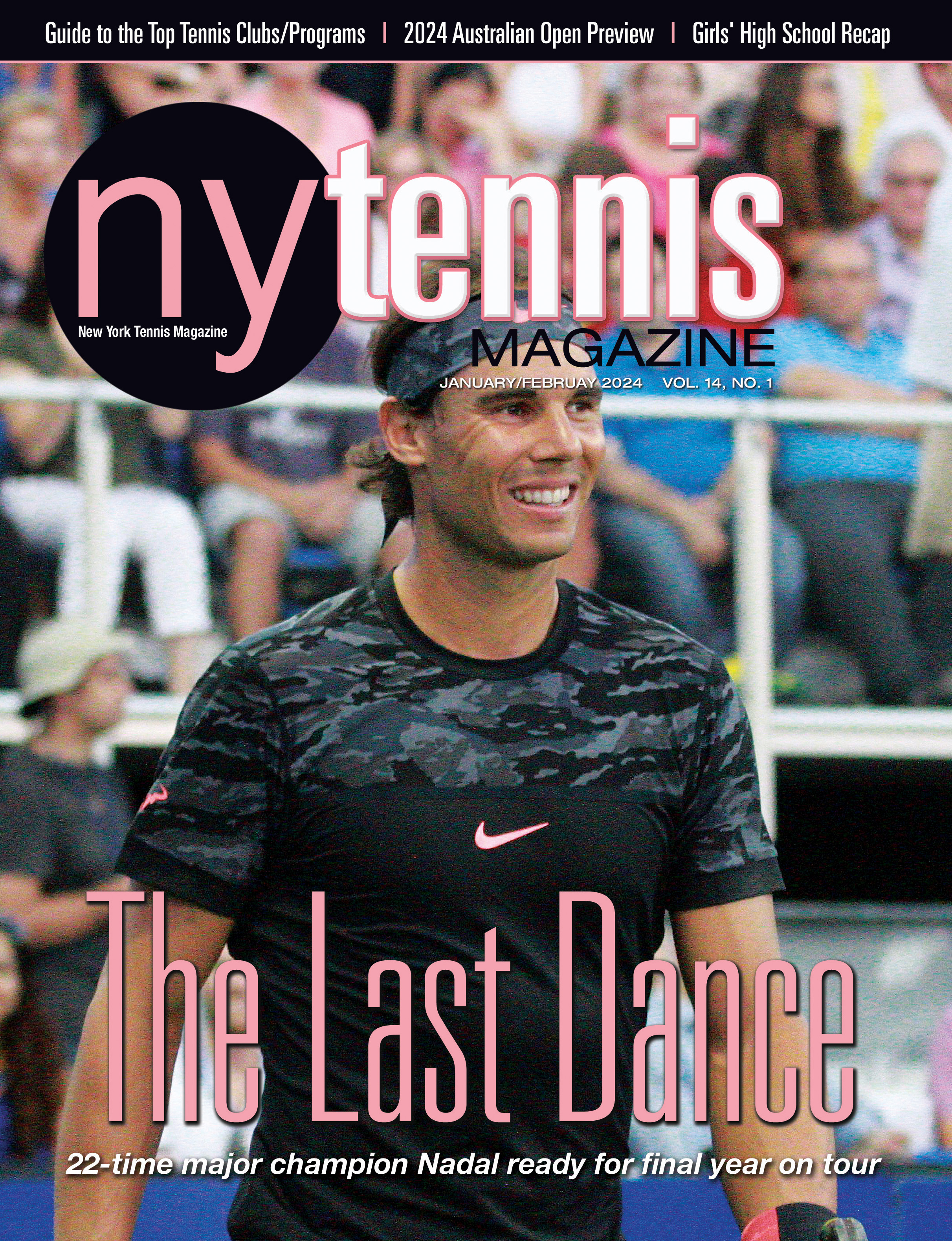A Look at the Mental Side of Tennis

Sometimes, as a tennis player, you exist on an island. Alone, solo, under the lights of your local club or drenched in the sun, there you are … between the lines, either gaining the accolades of glory hitting the winning shot or facing the weight of defeat. There are no teammates to pass to, no backup in case you throw a bad pitch or have a bad shift, no defense to pick you up after the offense turned the ball over … it’s just you who must deal with the adversity of this individual sport.
Due to the singular nature of the sport, one must develop nerves of steel and be able to pick themselves up when knocked down. Sure, you may have a strong support group of parents, family, school teammates and a coach, but in the heat of the battle, just one spotlight shines and shines brightly on YOU! This is where one of the most important people on your support team can come into play in helping you develop those aforementioned nerves of steel and the will to push onward, experts in sports psychology.
Mental toughness is what gives top players a competitive leg up over the opposition. Training one’s mind to deal with nerves, anxiety and quickly move onward past mistakes can be the difference between being crowned “champion” and “finalist.” These individuals help players focus, find their groove and enter the zone to success. It’s the ability of the player to quickly get back on track once rattled that can make the difference between bowing out in the first round of a tournament or hoisting the trophy at the end of the day.
New York Tennis Magazine was fortunate enough to sit down and chat with two experts in the field of sports psychology, Dr. Tom Ferraro and Rob Polishook, to pick their brains and gain insight into their role as one of the most vital members of a tennis player’s support staff.
Dr. Tom Ferraro is a sport psychologist with a Ph.D. from SUNY Stony Brook, with more than 25 years of experience working with professional teams, coaches and Olympic athletes across a broad range of sports. Dr. Ferraro is a board-certified psychoanalyst, which allows him to properly diagnose and treat the symptoms an athlete may bring to his him and help them understand any underlying reasons for self-defeat. He has been published internationally and has been featured in the New York Times, The Wall Street Journal, The London Times, and is a regular contributor to this publication.
As a mental training coach, Rob Polishook works with athletes and teams in all sports and at all levels, from middle school to professional athletes, teaching cutting-edge mental training skills and techniques, and providing the tools necessary for athletes to compete in high level pressure situations. Polishook’s unique approach recognizes that life events, such as stress, injuries, fears and emotional/physical trauma-like experiences can impact an athlete’s self-esteem, confidence and performance during competitive situations, assisting his clients to leave mistakes in the past and moving forward to reach their peak performance. Rob has earned a Master’s Degree in Psychological Studies with a concentration in Sport & Exercise Psychology at Seton Hall University, and has completed his Certification in Sport Psychology from Seton Hall. Rob is a Certified Professional Coach from IPEC, an International Federation Coaching Affiliate.
Both of you have worked with a number of athletes. Do you recommend that they play multiple sports in order to avoid burning out and losing their interest in tennis?
Dr. Tom Ferraro: The right amount of focused work always needs to be balanced with rest and other play activities. Most professional tennis athletes do get involved with other sports. Tennis players often turn to golf as in the case of Ivan Lendl or Pete Sampras. Golf is a relaxing sport, which does not strain the body and can be fun to do.
Rob Polishook: The key is to find balance. Either approach may work … it depends on the individual. Some athletes balance their tennis training with multiple sports and activities. Certainly, this approach is beneficial in regards to footwork, movement and working with others. Others may focus mainly on tennis, and in this case, the balance will have to come from another area.
What are some pre-match activities that can help a player be as fresh as possible for their upcoming competition?
Dr. Tom Ferraro: The best thing to do is to conserve energy and socialize in easy, non-stressful ways, get a full eight hours sleep, avoid alcohol or marijuana, and to “taper” all training for the three-day lead-in. This is done with all athletes. My family has owned many thoroughbred horses, and I have been able to watch some of the world’s greatest trainers prep the horses for big races. They always give them leisure time and do not run them in any vigorous way for three days leading up to a big race. I also learned that a horse runs best when rested prior to race day. That may go for tennis players as well.
Rob Polishook: Ultimately, the athlete wants to do whatever relaxes them. This question is player-specific. However, one should always go back to basics! What I recommend is banking at least eight hours of sleep per evening. Sleep is under-rated, and is so important to proper recovery. Additionally, drinking eight cups of water per day is important. Supplement this with some quiet time, which can come in the form of a 10-minute walk, meditation or stretching exercises. I recommend turning off all social media, e-mails and texts at least 90 minutes prior to a match.
How would you advise a player who feels they are being cheated by the umpire or is dealing with a controversial call?
Rob Polishook: Being able to deal with adversity is imperative for any player. It’s not a question whether bad calls or let courts will happen, but rather, how a player is able to recognize these situations and take a step back to refocus. Certainly in the case of a bad call, I like players to speak to their opponent or umpire and be able to state their case. However, if this doesn’t work, the player must reset and bring their focus back to what they can control. My players have an adversity management routine, a short routine specific to the individual that helps them re-center for the next point.
With the prevalence of social media today, do you find it more difficult for players to maintain mental strength and stability in tennis?
Dr. Tom Ferraro: Social media of all kinds usually distracts and adds unnecessary pressure to a player. Rory McIlroy, a top five golfer in the world, made an important statement recently about the media following his win at the Player’s Championship. He stated, “If I see that the Golf Channel is on when I am in the locker room prior to tee time, I tell the staff to turn off the sound. It is always possible that a TV person’s comment will be placed in the back of my mind and may influence me and my game plan.” This is a wise comment by McIlroy. It is best to avoid hearing or seeing anything at all about other players’ rankings or about yourself prior to game time in tennis.
Rob Polishook: Again this is player-specific. However, social media can certainly distract from tasks at hand. In fact, there is even a mental health term called FOMA, “Fear Of Missing Out.” This happens when individuals are always checking their devises because they don’t want to miss out on a conversation, thread or activities among others. I recommend turning all sounds and vibrations off of on the phone. This allows the nervous system to settle and the player to check their devices only when they want to, not when someone else wants their time. It’s best to leave phones and all social media interactions to after a match.
When negative thoughts begin to enter a player’s mind, what are some tricks or techniques to keeping their mind positive, despite the score or the way a match may be going?
Dr. Tom Ferraro: This process must be established long before match time. Players must be trained to expect mistakes and setbacks of all kinds, including missed shots, weather delays, nasty remarks and bad calls. They must be taught to have a mental mantra which they use to stay focused and positive, no matter what happens during the course of play. This is called “Murphy’s Law,” which means one must be prepared for glitches along the way and have an answer for that moment. Lots of time is spent on this in my practice because surprises always happen.







